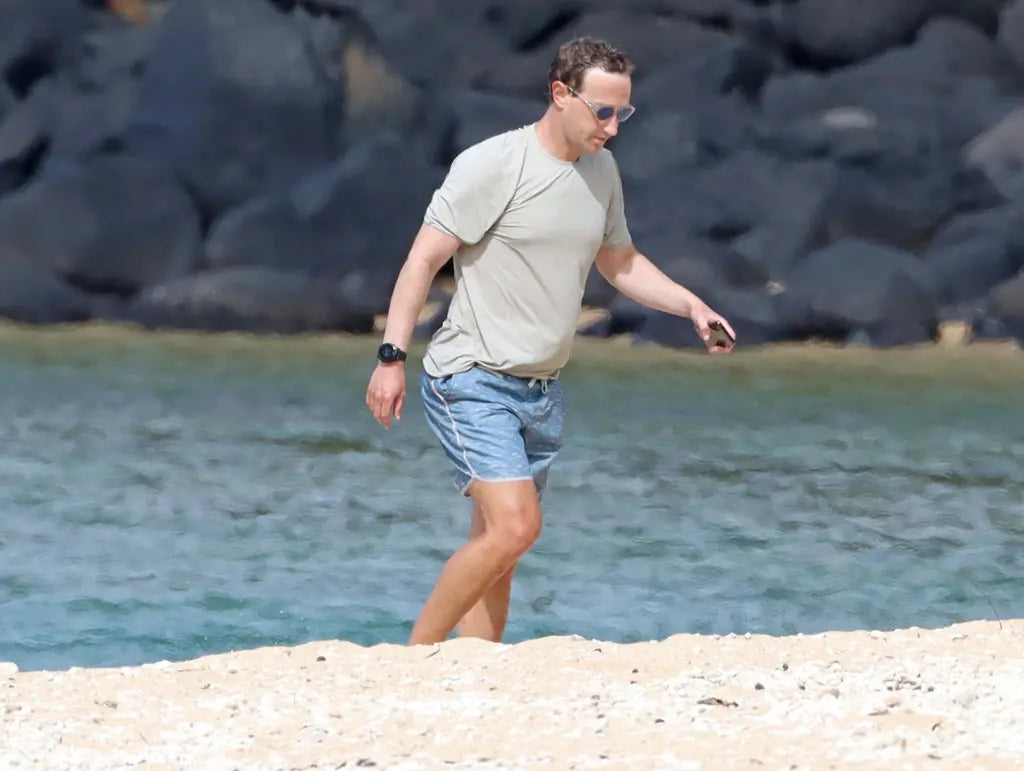Mark Zuckerberg Quietly Expands Kauai Estate by Nearly 1,000 Acres, Raising Local Concerns
Meta CEO Mark Zuckerberg has expanded his already massive compound on the Hawaiian island of Kauai, acquiring nearly 1,000 more acres of ranch land — and with it, more controversy.
According to WIRED, the latest purchase — 962 acres of land — was made earlier this year through an LLC. A source familiar with the sale estimated the deal to be worth over $65 million, bringing Zuckerberg’s total land ownership on Kauai to more than 2,300 acres. Property records place the market value of the new acquisition at around $75 million. 
The expansion adds to a sprawling estate already featuring two large mansions (together the size of a football field), guest houses, ranch buildings, a gym, a tennis court, saucer-shaped treehouses, and a private water system. One of the most talked-about features is a tunnel leading to an underground storm shelter about the size of an NBA court, complete with blast-resistant doors and an emergency escape hatch.
New planning documents also show proposals for three additional buildings, each ranging from 7,800 to over 11,000 square feet — roughly 10 times the size of an average Hawaiian home. Two of these include 16 bedrooms and 16 bathrooms in total, built in a motel-style layout with a shared lanai over 1,300 square feet. Each building includes cameras, motion sensors, and keypad locks.
Spokesperson Brandi Hoffine Barr described the new buildings as short-term housing for friends, family, and staff. 
Zuckerberg’s recent purchase reportedly includes land with a Native Hawaiian burial site, adding a deeply sensitive dimension to the project. Satellite images also show dozens of buildings not yet listed in public records. Based on the number of bedrooms in existing documents, the compound could eventually house over 100 people.
The land was sold by the Mary Lucas Trust Estate, once used for sugar plantations and later cattle grazing. While confirming the purchase, Hoffine Barr emphasized the couple’s commitment to agriculture and conservation at their Koʻolau Ranch. 
“Mark and Priscilla continue to make a home for their family and grow their ranching, farming, and conservation efforts,” said Barr. “The majority of the land is used for cattle ranching, organic ginger, macadamia nuts, turmeric farming, native plant restoration, and protecting endangered species.”
She also noted that the couple canceled previous development plans for 80 luxury homes on the land.
Their overall investment in Kauai now exceeds the island’s entire $311 million fiscal year 2024 operating budget.
One particularly emotional story comes from Julian Ako, a local man who discovered years ago that the property contained the burial site of his great-grandmother and her brother. It took months of negotiations for him to gain access to the graves and register them with Hawaii’s Department of Land and Natural Resources. According to WIRED, Ako believes other ancestors may still be buried on the land, but efforts to locate them have been unsuccessful. 
State officials confirmed the possibility of more burial sites based on oral histories. Hoffine Barr said the known site was fenced and maintained, and all project workers are required to report any inadvertent discovery of iwi — ancestral Hawaiian bones — per state regulations.
However, local residents are concerned these discoveries could be concealed due to strict nondisclosure agreements signed by workers.
“If they uncover iwi, it’s going to be a challenge for that to ever become public knowledge,” Ako told WIRED. “They’re putting their jobs in jeopardy.”

Zuckerberg’s interest in Kauai began in 2014 when he purchased 700 acres near Kilauea for $100 million. That deal included parcels where families held kuleana rights, traditional Native Hawaiian claims passed down through generations. In 2016, Zuckerberg filed “quiet title” lawsuits to clarify ownership — a move that triggered public backlash. Though he dropped the suits, the legal battle continued through local resident Carlos Andrade, who eventually gained ownership of the land at auction.
In a 2017 op-ed, Zuckerberg wrote that Andrade had cared for the land for over 40 years and could legally pass down kuleana rights.
By 2021, Zuckerberg added over 560 more acres, some bordering the scenic Larsen’s Beach. Later that year, he acquired another 110 acres, including the site of the Kaloko Dam — a structure that failed in 2006, killing seven people.
Zuckerberg’s growing footprint has been met with mixed reactions. On one hand, he’s donated millions to local nonprofits, including a charter school and an affordable housing initiative. His projects have also created high-paying jobs. On the other hand, many residents fear the long-term impact of billionaires reshaping the island.
“If our island has any hope of remaining Hawaii, this kind of activity has got to stop,” said Puali‘i Rossi, professor of Native Hawaiian studies at Kauai Community College. “Eventually Hawaii isn’t going to look like Hawaii anymore — it’s going to be a resort community. Are we really thinking about 100 years from now, what this island is going to look like?”


